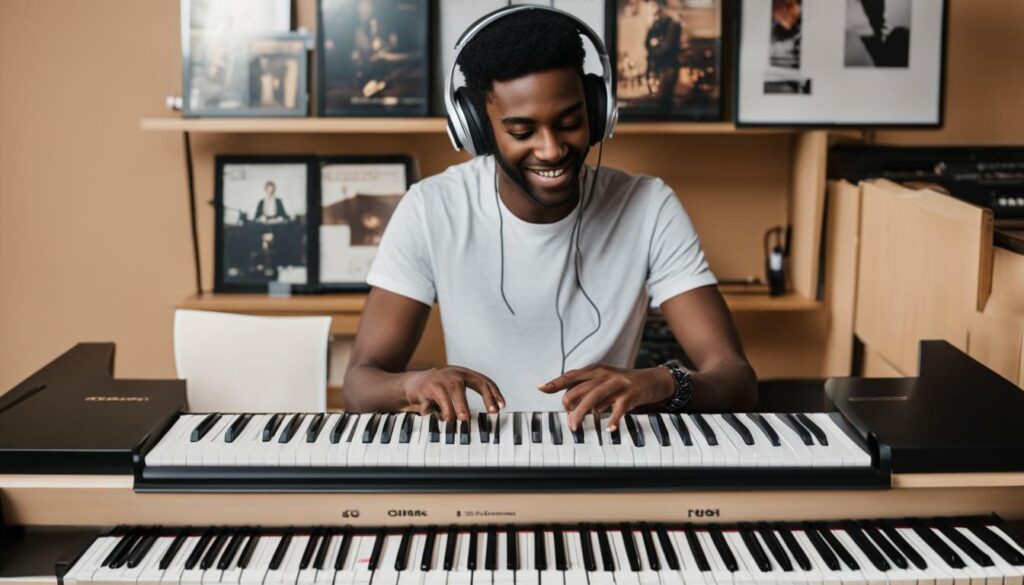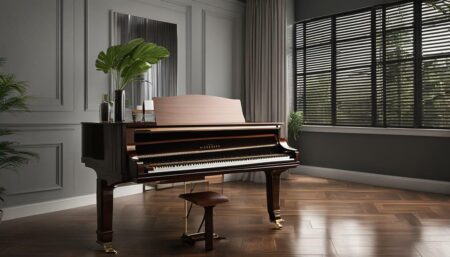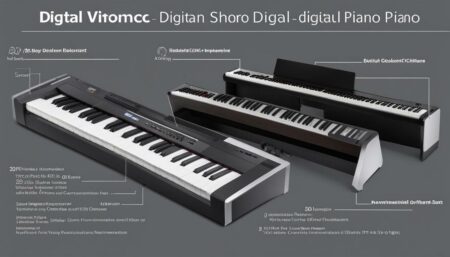As a beginner looking to learn the piano, choosing the right instrument can be overwhelming. With so many options available in the market, from digital pianos to keyboards, it can be challenging to determine which one is best suited for your needs. Both digital pianos and keyboards have their benefits and considerations, making it essential to understand the differences between them before making a decision.
Digital pianos are designed to mimic the sound and feel of an acoustic piano while providing advanced features such as the ability to connect to educational apps or software. On the other hand, keyboards are smaller, portable, and usually more affordable than digital pianos. They are also capable of producing a wide range of sounds and effects, making them ideal for exploring different music genres.
In this article, we will explore the question of whether a beginner should opt for a keyboard or a digital piano when starting their musical journey. We will discuss the benefits and considerations for each option, helping beginners make an informed decision.
- Digital pianos and keyboards have unique benefits and considerations for beginners.
- Understanding the differences between them is crucial in making an informed decision.
- Factors such as budget, key count, sound quality, and built-in features should be considered when choosing an instrument.
- There are numerous learning resources and models available for beginner digital piano keyboards.
- Proper guidance and structured learning are essential for effective progress.
Understanding the Differences Between a Keyboard and a Digital Piano
Before diving into the decision of which instrument to choose, it’s important to understand the differences between a keyboard and a digital piano.
Firstly, keyboard pianos are generally smaller and more lightweight, making them a great option for those who are short on space or need to move their instrument frequently. They are also more affordable than their digital piano counterparts, making them a great option for beginners who want to test the waters before investing in a more expensive instrument.
On the other hand, digital pianos are more similar to acoustic pianos in terms of sound and feel. They typically have weighted keys, which means they feel more like a real piano when playing. Additionally, digital pianos have a wider range of sound options and functionalities, making them great for players who want to experiment with different genres and sounds.
When it comes to entry-level digital piano keyboards, they bridge the gap between keyboards and digital pianos. They usually have fewer keys than traditional digital pianos and don’t offer as many advanced functionalities, but they still offer a more realistic piano playing experience than keyboard pianos.
Ultimately, the choice between a keyboard, entry-level digital piano, or digital piano for beginners comes down to personal preferences and needs. Understanding the differences between these instruments can help beginners make an informed decision about which one to choose.
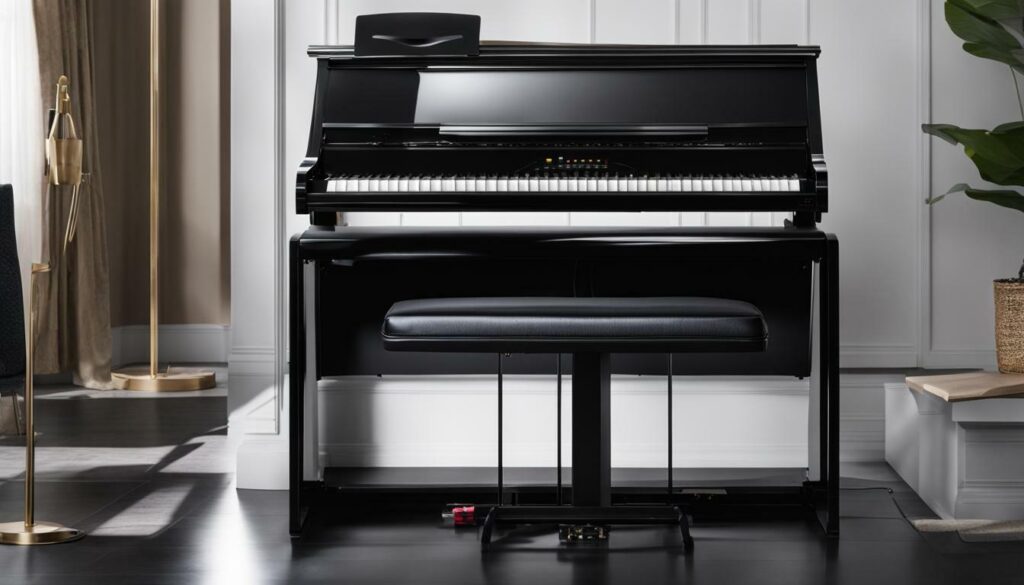
If you’re just starting out on your musical journey, a beginner digital piano keyboard can be an excellent choice. Here are some of the benefits:
- Affordability: Beginner digital piano keyboards are generally less expensive than entry-level digital pianos or acoustic pianos. They offer a cost-effective way to start learning without breaking the bank.
- Versatility: With a beginner digital piano keyboard, you can play a variety of musical styles, including classical, pop, and jazz. Many models also have built-in accompaniment features or the ability to connect to music software, allowing you to experiment and create your own compositions.
- Portability: Beginner digital piano keyboards are usually lightweight and compact, making them easy to transport and store. This means you can practice wherever and whenever you like, whether at home, in a studio, or on the go.
- Connectivity: Beginner digital piano keyboards often come with built-in connectivity features, allowing you to connect to educational apps, software, or online lessons. This can enhance your learning experience and give you access to a wealth of resources.
Whether you’re a complete beginner or have some musical experience, a beginner digital piano keyboard can be an excellent choice for starting your musical journey.
While digital pianos are an excellent option for beginners, keyboards also have their advantages, making them a popular choice for some players. If you’re a beginner looking for an instrument that is lightweight, portable, and doesn’t break the bank, a keyboard might be the best option for you.
Here are some advantages of choosing a keyboard as your beginner piano:
| Advantages | Explanation |
|---|---|
| Compact and Portable | Keyboards are smaller and lighter than digital pianos, making them easy to store and transport. |
| Affordable | Entry-level keyboards are usually less expensive than entry-level digital pianos, making them a budget-friendly option for beginners. |
| Easy to Use | Keyboards are user-friendly, with an intuitive layout and fewer controls than digital pianos, making them easier to navigate, especially for beginners. |
| Versatile | Keyboards offer a range of sounds and effects, making them ideal for exploring different music genres and experimenting with various sounds. |
Overall, while digital pianos provide a more authentic playing experience, keyboards offer flexibility, affordability, and convenience, making them an excellent option for beginner piano players.

Choosing the right beginner digital piano keyboard requires considering various factors. Here are some important considerations to keep in mind:
Budget
Cost is a critical factor for beginners. Fortunately, there are affordable beginner digital piano keyboards available in the market. These keyboards vary in price, so it’s essential to decide on a budget that suits your needs.
Key count
The number of keys on a keyboard affects its playability and versatility. For beginners, a keyboard with 61 keys is a good starting point. Some models with 88 keys offer better sound quality and touch sensitivity but can be more expensive.
Sound quality
The sound quality of a beginner digital piano keyboard is essential. It should have a good sound output and a variety of tones. Models with built-in speakers and headphone jacks are ideal for learners who want to practice without disturbing others.
Built-in features
Some beginner digital piano keyboards have built-in features like metronomes, recording capabilities, and learning modes. These can be useful for honing skills and practicing with structure.
Connectivity options
Connectivity options such as USB and MIDI ports enable a beginner digital piano keyboard to connect to computers, tablets, or smartphones for use with various apps and software. This feature can enhance the learning experience and provide more options for playing and practicing.
By considering these factors, beginners can make an educated decision that suits their needs and preferences while selecting the best beginner digital piano keyboard.
Learning resources for beginner digital piano keyboard players
Learning to play a digital piano can be a rewarding experience, but it can also be challenging for beginners. Fortunately, there are abundant resources available to support beginners in their musical journey. Here are some resources that can help:
Online tutorials
There are countless video tutorials available on platforms like YouTube, which cover everything from the basics of playing the digital piano to more advanced techniques. Finding a tutorial that resonates with your learning style can be helpful in reinforcing concepts and building skills.
Apps and software
Many educational apps and software are designed specifically for beginner digital piano players. These apps offer a variety of features such as guided lessons, built-in exercises, and instant feedback, helping beginners progress faster and more effectively.
“Using an app like Simply Piano has been a game changer for me. It’s like having a personal tutor right at my fingertips!” – Amy, beginner digital piano player
Structured learning programs
Structured learning programs, such as online courses or in-person lessons, can provide beginners with the guidance and support they need to develop strong fundamentals and progress in their musical journey. Many instructors tailor their lessons specifically to digital piano players, ensuring that students receive proper guidance to maximize their learning experience.
Community resources
Joining a community of digital piano players can be a great way to connect with other beginners, share learning resources, and receive feedback and support. Online forums, social media groups, and local music associations can be good places to start.
By utilizing these learning resources and seeking proper guidance, beginners can develop strong foundations and progress effectively in their digital piano journey!
Choosing the right beginner digital piano keyboard can be overwhelming, given the numerous options available in the market. To help narrow down the choices, we have compiled a list of popular beginner digital piano keyboards that offer excellent value for money and are user-friendly for new learners.
| Name | Key Count | Weighted Keys | Sound Quality | Price |
|---|---|---|---|---|
| Casio CTK-2550 | 61 | No | Good | $100-150 |
| Alesis Recital | 88 | Semi-Weighted | Excellent | $200-300 |
| Yamaha P-45 | 88 | Weighted | Superb | $400-500 |
| Casio PX-160 | 88 | Weighted | Exceptional | $500-600 |
These models are some of the best beginner digital piano keyboards in terms of quality, features, and affordability. The Casio CTK-2550 is an excellent entry-level model for those on a tight budget, while the Alesis Recital offers a full-sized keyboard with semi-weighted keys and built-in speakers. The Yamaha P-45 provides exceptional sound quality and weighted keys, ideal for learners who want to replicate the feel of a traditional piano. For those willing to invest in a more advanced model, the Casio PX-160 is a perfect choice, combining responsive keys, high-quality sound, and extra features.
Whether you are just starting or looking to upgrade, these popular beginner digital piano keyboard models are proven to deliver exceptional performance and value, making your musical journey enjoyable and rewarding.
Learning to play the digital piano keyboard can be an exciting and rewarding experience. As a beginner, it is essential to develop good habits for effective progress. Here are some valuable tips to help you get started:
- Practice regularly: Consistency is key when starting. Dedicate a regular time slot for practice and stick to it.
- Start with the basics: Begin by mastering the basics, such as finger positioning and hand posture. Practice scales and chords to build a strong foundation.
- Experiment with different sounds: A digital piano keyboard offers a range of sounds and effects. Experiment with different sounds to enhance your playing experience and broaden your musical horizons.
- Take breaks: Playing for extended periods can lead to fatigue and strain. Take short breaks to rest your fingers and refresh your mind.
- Optimize your setup: Make sure your digital piano keyboard is set up correctly for optimal playing experience. Adjust the height and position of the keyboard to ensure proper posture and reduce strain.
- Get feedback: Seek feedback from a teacher or mentor to help address any mistakes and improve your playing skills.
- Explore online resources: There are several online resources available for beginners, including tutorials, forums, and educational apps. Take advantage of these resources to enhance your learning experience.
By following these tips, beginners can develop good habits and maximize their progress on the digital piano keyboard. Keep learning and exploring to enjoy the full benefits of this dynamic instrument.
The first step in beginning your musical journey with a digital piano keyboard is to have a proper set-up. Choose a quiet area where you can concentrate on your playing. Make sure the keyboard is placed on a stable surface, with the correct height and angle for you to sit comfortably and maintain good posture while playing. Adjust the bench height so that your elbows are slightly above the keys, and your forearms are parallel to the floor.
Once you have your set-up ready, it’s time to turn on your beginner digital piano keyboard. Check the manual for specific instructions on how to do this. Usually, it involves plugging it into a power source and turning on the switch.
As a beginner, it’s recommended to start with a simple melody or a few basic chords. This will help you familiarize yourself with the keys and develop your muscle memory. Begin with a slow tempo and gradually increase it as you gain confidence. Remember to practice consistently and seek the guidance of a qualified instructor if possible.
Another important aspect of using a beginner digital piano keyboard is exploring its different features. Most digital pianos come with various built-in sounds, recording capabilities, and connectivity options. Experimenting with these features can help you discover new sounds and enhance your playing experience.
Lastly, it’s essential to take care of your beginner electronic piano. Keep it clean and dust-free, and avoid placing it in areas with extreme temperature or humidity. Regularly test and tune the keys to ensure optimal performance.
Overall, a beginner digital piano keyboard is a fantastic instrument to embark on a musical journey. With the right set-up, guidance, and practice, you can develop your skills and achieve your musical aspirations. Start your journey today with a beginner digital piano keyboard!
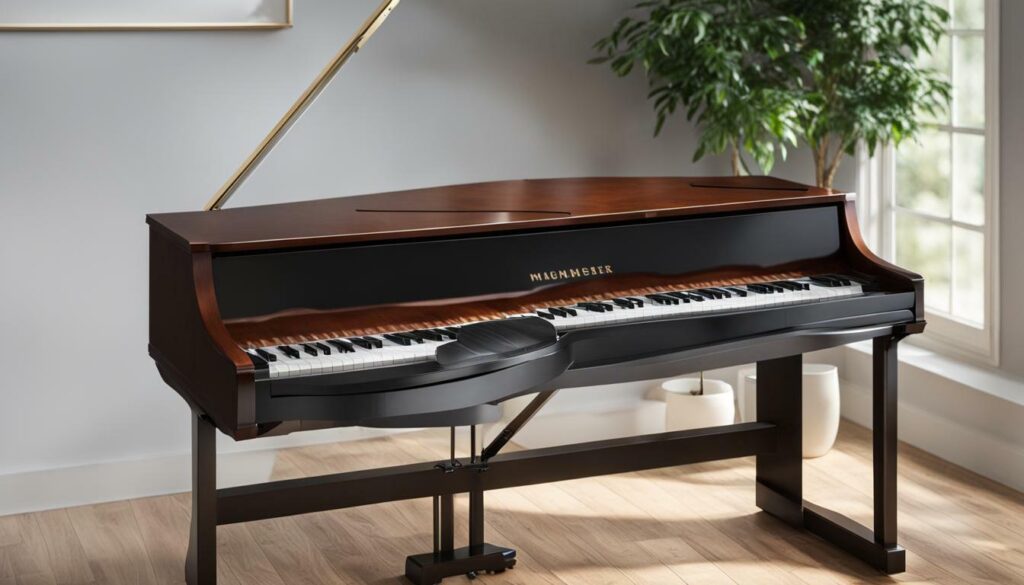
As you continue on your musical journey, you may find that your beginner digital piano keyboard no longer meets your needs. Fortunately, there are several options for advancing players.
One possibility is to upgrade to a more advanced digital piano, with features geared towards intermediate or advanced players. These instruments typically offer more advanced sound technology, greater expressiveness in touch-sensitive keys, and additional features such as recording capabilities.
Alternatively, you may choose to consider an acoustic piano, which offers a distinct sound and feel that some players prefer. While more expensive and less portable than digital options, acoustic pianos provide a unique playing experience that can be beneficial for developing technical skills and exploring different playing styles.
Regardless of your choice, continued practice and dedication to honing your skills is essential for progressing as a player. Continue to seek out learning resources, practice regularly, and explore different genres and playing techniques to unlock your full potential as a musician.
Keep in mind that the journey towards becoming an accomplished pianist is a long and rewarding one. With patience, dedication, and the right instrument, you can continue to develop your skills and achieve your musical aspirations.
Conclusion
Choosing between a keyboard and a digital piano for beginners can be a daunting task, but it’s important to remember that both options have their unique advantages.
Whether you opt for a beginner digital piano keyboard or a keyboard designed for beginner piano players, the decision ultimately comes down to individual preferences and specific needs.
By understanding the differences between the two instruments, considering the factors discussed, and exploring the available resources, beginners can confidently select the instrument that best suits their aspirations and budget.
Remember to take advantage of online tutorials, apps, and software specifically tailored for beginners using digital pianos to support your musical journey. Additionally, make sure to practice proper posture and hand positioning, follow structured learning, and maintain your instrument to maximize your learning experience.
Begin your musical journey today with a beginner digital piano keyboard or keyboard designed for beginner piano players and enjoy the endless possibilities that music has to offer!
FAQ
Q: Should a beginner get a keyboard or digital piano?
A: The choice between a keyboard and a digital piano depends on individual preferences and needs. Both options have their advantages, so it’s important to consider factors such as budget, size, sound quality, and extra functionalities before making a decision.
Q: What are the differences between a keyboard and a digital piano?
A: Keyboards are generally smaller, more affordable, and have fewer built-in features compared to digital pianos. Digital pianos, on the other hand, offer a more authentic piano experience with weighted keys, better sound quality, and additional features like recording and connectivity options.
Q: What are the benefits of a beginner digital piano keyboard?
A: Beginner digital piano keyboards are affordable, versatile, portable, and often come with educational apps or software that can enhance the learning experience. They provide a good starting point for beginners to learn piano without breaking the bank.
Q: What advantages does a keyboard have for beginner piano players?
A: Keyboards are compact, affordable, and easy to use, making them a popular choice for beginners. They also allow for experimentation with different music genres and offer a variety of sounds and effects to explore.
Q: What factors should I consider when choosing a beginner digital piano keyboard?
A: When choosing a beginner digital piano keyboard, consider factors such as your budget, the number of keys you prefer, sound quality, built-in features like metronome or lesson modes, and connectivity options like USB or MIDI.
Q: Are there any learning resources available for beginner digital piano keyboard players?
A: Yes, there are numerous online tutorials, apps, and software specifically designed for beginners using digital pianos. These resources can provide structured learning, guidance, and practice exercises to help beginners progress effectively.
Q: What are some popular beginner digital piano keyboard models?
A: Some popular beginner digital piano keyboard models include [model names], known for their quality, affordability, and user-friendly features. It’s always a good idea to read user reviews and consider your specific needs before making a purchase.
Q: Can you provide some tips for beginners using a digital piano keyboard?
A: Certainly! Here are some tips for beginners using a digital piano keyboard: maintain proper posture and hand positioning, practice regularly, start with simple exercises and gradually increase difficulty, use headphones for focused practice, and follow proper instrument maintenance guidelines.
Q: How do I get started with a beginner digital piano keyboard?
A: To get started with a beginner digital piano keyboard, assemble the instrument according to the manufacturer’s instructions. Adjust settings such as volume and touch sensitivity to your preference. Begin exploring different sounds and practice basic exercises to familiarize yourself with the instrument.
Q: What should I do when I outgrow my beginner digital piano keyboard?
A: As you advance in your musical journey, you may consider upgrading to a more advanced digital piano or even an acoustic piano. These instruments offer additional features, better sound quality, and a more authentic playing experience. Consider your goals, budget, and long-term commitment to make an informed decision.



